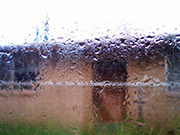

(C) morgueFile & cohdra
湿気の多いカビの生えた家に住んでいると,うつ病になる危険性が高いらしい。疫学者を中心とする研究班が,うつ症状と住居の状態に関して,約6,000名のヨーロッパ人のデータを調べたところ,2つの関連がみつかったという。1つは,湿ってカビの生えた住宅環境にいると,自分で環境を管理できていないという認識が生まれること,もう1つは,喘鳴やのどの病気など,実際にカビが原因とみられる身体的症状が引き起こされること。これらがうつ病に関係すると考えられる。研究班は,カビが直接うつ病の原因となるか研究する予定だ。(吉田素子)
A groundbreaking(1) public health(2) study has found a connection between damp(3), moldy(4) homes and depression(5). The study, led by Brown University epidemiologist(6) Edmond Shenassa, is the largest investigation(7) of an association(8) between mold and mood and is the first such investigation conducted outside the United Kingdom.
Shenassa said the findings(9), published in the American Journal of Public Health, came as a complete surprise. In fact(10), after a few U.K. studies published in the last decade(11) had suggested a link, Shenassa and his skeptical(12) team set out to(13) debunk(14) the notion(15) that any link existed.
“We thought that once we statistically(16) accounted for(17) factors(18) that could clearly contribute to(19) depression -- things like employment status(20) and crowding(21) -- we would see any link vanish(22),” said Shenassa, the lead author(23) of the study and an associate professor(24) in the Department of Community Health(25) at Brown. “But the opposite was true. We found a solid(26) association between depression and living in a damp, moldy home.”
Shenassa noted the study, an analysis of data from nearly 6,000 European adults, does not prove that moldy homes cause depression. The study wasn’t designed to draw that direct conclusion(27). However, Shenassa’s team did find a connection, one likely driven by(28) two factors. One factor is a perceived(29) lack of control(30) over the housing environment(31). The other is mold-related(32) health problems such as wheezing(33), fatigue(34)and a cold or throat illness.
“Physical health(35), and perceptions(36) of control, are linked with(37) an elevated(38) risk for depression,” Shenassa said, “and that makes sense(39). If you are sick from mold, and feel you can’t get rid of(40) it, it may affect your mental health(41).”
(1) 画期的な (2) 公衆衛生 (3) 湿った (4) カビの生えた (5) うつ病 (6) 疫学者 (7) 研究 (8) 関連
(9) 発見 (10) 実際に (11) 10年間 (12) 疑い深い (13) ~することを試みた (14) ~の誤りを暴く
(15) 意見,考え (16) 統計的に (17) ~について明らかにした (18) 要因 (19) ~の一因となる
(20) 雇用状況 (21) 混み合い (22) なくなる (23) 主執筆者 (24) 准教授 (25) 地域保健 (26) 確固とした
(27) (draw a ~)結論を下す (28) ~によって決定される (29) 認識された (30) 管理不足 (31) 住宅環境
(32) カビに関連した (33) 喘鳴 (34) 倦怠感 (35) 身体的健康 (36) 認識 (37) ~に関連している
(38) 上昇した (39) うなずける (40) ~を取り除く (41) 精神衛生


